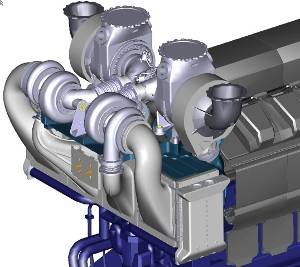Wärtsilä, ABB Turbo Develop Emissions Technology
The 2-stage turbocharging technology being tested on a 20-cylinder Wärtsilä 32 engine in the laboratory in Vaasa, Finland. (Photo courtesy Wärtsilä Corporation)
Wärtsilä and ABB Turbo Systems are co-operating in a joint development program for a new application of two-stage turbocharging on large diesel engines. Advanced engine technology, together with two-stage turbocharging, offers significant advantages in fuel consumption and engine emissions.
The application of two-stage turbocharging technology on Wärtsilä diesel engines has been developed through close co-operation between Wärtsilä and ABB Turbo Systems. In this program, Wärtsilä is focusing on developing advanced engine technology, which with the turbocharger, is able to reach the highest possible performance and become a cost-effective commercial solution for its customers. ABB Turbo Systems is delivering the turbocharging technology with defined performance in terms of airflow, pressure ratios and efficiency.
Benefits of reduced emissions and fuel consumption
In the new engine design, two turbochargers are arranged in series to generate increased air pressure, airflow and a superior turbocharging effect. This results in an efficiency rating of up to 76 per cent, which is extremely high. The increased air pressure, combined with the advanced engine technology, improves the engine output and power density by up to 10 per cent. At the same time, both fuel consumption and CO2 emissions are reduced.
Further emissions reduction can be achieved with additional engine systems or by the use of exhaust gas after-treatment. A precise combination of fuel consumption levels and reductions in CO2 and NOx emissions can be selected through detailed systems configuration. Intelligent engine control allows optimum operation of the advanced engine design over the whole load range, and a significant reduction in NOx emissions can be reached. At high altitudes, 2-stage turbocharging technology guarantees the engine's operational performance by compensating for the reduced air density.
The significant reductions in fuel consumption and emissions are the result of extensive joint testing of the 2-stage turbocharging system on the Wärtsilä engine. The tests have taken place at Wärtsilä's test facility in Vaasa, Finland, and the targets for the development programme have been successfully met. Wärtsilä and ABB Turbo Systems are planning to initiate a major pilot project with a customer in the near future.
Lower lifecycle costs
Another driving factor in this development work has been to significantly lower lifecycle costs, and this target has been met. So too has the goal of lowering NOx emissions. The market potential for this technology in power plants is believed to be big. Similarly, the advanced technology for combustion control developed by Wärtsilä will be beneficial to the shipping market, when the market requirements are in place. Here, in addition to costs, the compactness and cost effective design are considered to be of importance. Calculations indicate that in certain power plant applications, the investment in advanced 2-stage engine technology could be regained in less than two years of operation.
"The conceptual design for the new power plant engine began three years ago," said Mikael Troberg. "Testing of the concept, and verification of the technology, has been successfully carried out using four-stroke Wärtsilä 20 and Wärtsilä 32 engines. We see this technology as being a key for the next generation of Wärtsilä emissions-friendly engines. The technology has been developed for the four-stroke portfolio, in both marine and power plant applications. The next logical step is the two-stroke engine family for large vessels, typically as single engine installations."














